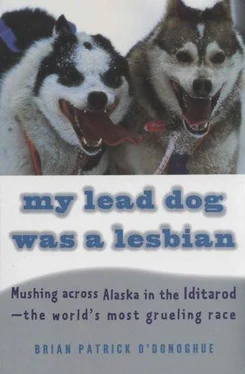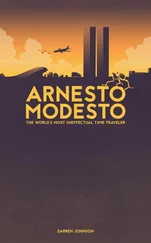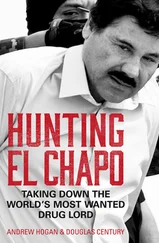Dave Dalton, a fellow Fairbanks musher, could testify to that. A few miles after leaving his kennel, his Dalton Gang team had met an angry moose head-on. The moose’s charge didn’t do any damage, but it was likely to get a second shot. The team had no other route home. Dalton had his pistol ready on the return trip. Sure enough, the moose was waiting. It flared its nose and barreled into the team. Taking aim, Dalton squeezed the trigger.
The gun jammed.
The moose crashed into the sled, sending the musher flying. The Gang made a clean getaway. Dave’s situation remained ticklish. He was chest-deep in snow, looking upward at a huge bull that was snorting with anger.
Very, very carefully Dalton backed away from the trail, watching the moose the whole way. When he was safely out of view, he slowly circled around the trail’s new owner and walked home. He found the Dalton Gang waiting for him there.
I’d had my own creepy moments — nights when the dogs’ ears had suddenly perked up and the headlamp had revealed fresh tracks ahead. So far, today’s carcass was the only moose we’d actually touched. Close enough. I was a fool for putting off getting the gun from Madman.
Leaving the river behind, I relaxed. That dead moose was miles behind us. The trail broke into the open, crossing several fields, then turned down a narrow tree-lined tunnel. Midway down that shaded passage, like apparitions, two menacing brown shapes rose from the snow ahead. It was a large cow and her calf. They blocked our path, only 15 yards ahead. The dogs were wild to chase them. I dug in with the brake, but the soft, deep snow offered almost nothing to grip. It was a struggle holding them back. No way could I secure the sled and turn the team around.
The cow moose was eager to avoid us. She lurched into the woods, but the calf wouldn’t follow. It continued stumbling down the center of the trail, breaking through the crust with its spindly legs. The cow took a parallel course, plowing a new path through the deep snow blanketing the woods.
The dogs clawed steadily forward. It was all I could do to maintain a gap. The trail finally emerged onto a plowed road. The moose scrambled to get away. I let off the brake, and we chased them until they ran back into the woods. Another crisis, passed.
Mowry and I dropped by Madman’s the next day. We left toting a.306-caliber rifle.
Training an Iditarod team made a mess of my working life. At top speed my dogs covered, maybe, 10–12 miles an hour. Add in the time required to get the team ready, then put them away, and it took as long as four hours to complete a 20-mile training run. Try to take a team 50 miles, and a whole day would be shot.
My bosses at the paper were supportive. Sam, the city editor, had grown up with a dog team. He knew what I was talking about when I’d show up an hour late, explaining that Rainy had got loose again and danced, just out of reach, for 45 minutes. But even Sam failed to grasp my overall predicament. Owning a recreational dog team didn’t compare with preparing for the Iditarod.
Take the meat shipment from Montana. For nearly a week, Mowry and I were on call, waiting for word from Rick Armstrong, the organizer of Two Rivers’ bulk delivery. The day Tim fled east for the holidays, I found a message waiting on my return from the airport. Naturally, the damn delivery truck was finally here. And I was already late to work.
Rushing over to the pickup site, I found Joe Garnie and half a dozen other mushers waiting by the semi in their empty pickups. Garnie was from Teller, an Inupiat village northeast of Nome. He’d recently moved to the Interior.
Like the knuckle hop, ear pull, and other traditional contests held at the annual World Eskimo-Indian Olympics, sled-dog racing has long been a source of friendly rivalry among Alaska’s regional and ethnic communities. Athabaskan mushers from the Interior river villages held the edge during the early 1970s, dominating the established sprint circuit and Redington’s new race to Nome. Advances in nutrition and conditioning strategies helped mushers such as Rick Swenson and Susan Butcher eventually outdistance the Athabaskan drivers, but the kennel bloodlines of most champions were still rooted in the Indian villages.
Like other racers from the Seward Peninsula, Garnie’s dogs excelled in the coastal wind, as his former partner Libby Riddles proved with a famous charge into a storm. Joe had come within an hour of winning the Iditarod himself, something no Eskimo musher had ever done. This year he hoped the change of scenery and the cheap dog food available in the Interior would enable him to correct that previous affront.
Armstrong was finishing his paperwork with Doug Swingley, our Montana meat supplier. Thirty minutes stretched to an hour. I could imagine the questions starting to circulate in the newsroom. “So, any bets on what time Brian will make it in?” But there was nothing to be done. I had $1,866 of meat in that truck: 3,000 pounds of ground beef, 900 pounds of liver, and 600 pounds of lamb.
Deadline Dog Farm’s meat was in the very front of the truck, so I had to help clear out everybody else’s load before I could begin collecting mine. Stacks and stacks of frozen 50-pound blocks were passed out, forming new piles in the waiting pickups. Minutes ticked away, and I fought the urge to scream.
I finally rolled into work four hours late and physically destroyed. I was exhausted and close to the breaking point, but luckily nobody said a word, and it was a quiet shift. All I had to do was swing by the cop shops, write up the crime blotter, and slap together a graph on historic weather records. Another day in training.
By January the time demands of my race preparations were out of control. Dan Joling, the managing editor, agreed to let me cut back to contributing a single weekly column for the duration. The column, “Off to the Races,” described what it was like to be a rookie preparing for Alaska’s Great Race. The Associated Press distributed a condensed version statewide. Of course, my pay dropped accordingly, but time was the currency that mattered at this point.
One day in mid-February, less than three weeks before the race, I found a message waiting at the News-Miner. Virginia, the newspaper’s business manager, wanted to see me. There had been a mistake, she said. As a part-time employee, I no longer qualified for free health insurance. To maintain my medical coverage, I’d have to come up with several hundred dollars in premiums.
“Cancel it,” I said.
I wasn’t the only one putting dogs ahead of the job.
A year before, Jon Terhune, an abrasive oil company machinist from Soldotna, had approached his plant manager at Unocal Chemicals. Advising the manager of his wish to enter the next Iditarod, Terhune asked what could be done. A month of unpaid leave was subsequently approved, so long as the machinist took the time off in conjunction with his vacation. In July, on the first day entries were accepted, Terhune signed up, becoming the twenty-fourth musher on the list.
The former army paratrooper was a dour man, with little patience for fools. One day in 1969, Jon, his first wife, Nancy, and their daughter, Heidi, had thrown everything they owned in the family’s station wagon and left the East Coast for good. Traveling westbound out of Albany, they saw cars on the other side of the highway backed up three lanes deep. The Terhunes learned from the radio that the traffic was caused by people heading to a big music festival. Nancy wanted to turn around and join the procession to Woodstock.
Her husband refused to even consider it. “That’s the reason we’re leaving,” he said, pointing to the traffic. “It’s getting to be a rat race.”
After settling in Alaska, Terhune began raising malamutes as a hobby. He got into mushing in the mid-1980s, running castoffs from Harry Sutherland. After Nancy died, Terhune found an outlet in the sport. Dogs offered companionship with none of the hassles people inevitably brought into his life. Breeding a few dogs, buying a few more dogs, Terhune gradually built a racing kennel. In 1990 he ran the Kusko 300, a grueling race through Eskimo villages in the Kobuk Valley. It was hellish. All the other rookies dropped out. Terhune spent ten hours searching for the trail in a whiteout and slipped far behind the veteran racers. But he never considered giving up. Not Terhune.
Читать дальше












